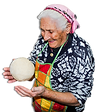LINA HADDAD
Captured by The Recipe Hunters in Lebanon

How did we meet Lina?
Zeinab Jeambey, the Food Heritage Management Specialist and our friend, took us on a segment of Lebanon's darb el karam food trail where we traveled to Kherbet Qanafar, a predominantly Christian village in West Bekaa valley. Upon arriving in the beautiful valley village, Lina Haddad, a local mouneh (winter preserves) producer invited us into her home and taught us how to make “Kaak bi Halib” or Lebanese Milk Cookies, Kibbet la'tin (a vegetarian pumpkin kibbeh), and Harra bi Isbaou (lebanese markook pudding).
From Kindergarten Teacher to Mouneh Maker:
Over kibbeh making, kneading and baking, Lina told us her story:
Lina has spent her whole life in the Bekaa Valley and lives there with her husband and two grown children. After many years working happily as a kindergarten teacher, Lina lost her job. Times were changing. Lina had never gained a diploma and because of that, she was no longer qualified to teach.
Around the same time Lina lost her job, her son was accepted into the Lebanese American University (LAU) in Beirut. Wanting to help her family out financially, Lina decided to find more work. Someone in her village told her that she should sell mulberries. “The first day I harvested mulberries, I picked 30 kilos and tried to sell them in my village.”
Lina was not able to sell all of them so she started to make mulberry juice, syrup, and mulberry jam. “Then I had excess mulberry syrup so I went to nearby villages to sell. The villagers loved my mulberry preserves and began asking me if I made other products like apricot jams. I did not, but I told them yes. That is when I began making the mouneh.” Mouneh is Lebanese for “pantry.” Mouneh is the word used to represent all preserves made after the harvest. It is the jams, preserves, dried grains, dried herbs, yogurt, and pickles.
How did Lina develop her cooking skills?
Lina combined her knowledge of cooking from the women in her family with Lebanese cookbooks. She began mastering her jamming techniques and is now very well known in the region for her wholesome, traditional products. "I tried many different techniques and recipes until I perfected them, to me it was the only way." Lina also makes kibbeh and sells it to people in local villages. Lina believes in sourcing her raw ingredients from local farmers, ensuring their quality and freshness. She says, "knowing your local producer and using high quality ingredients is just as important as knowing the recipe."
Why is Lina a food trail host?
"I decided to be a host on the food trail because it allows me to share my culinary knowledge, tradition, and my love for cooking with interested people. The food heritage foundation allows me to share the beauty, food and hospitality of promoting my village that I am so very proud of.
Thank you Lina and Zeinab
Our day together was full of laughter, fun, challenging each other to perfect Lina's artisan techniques, and of course eating. From trying homemade labneh, to shaping kibbeh around our thumb each activity was done with joy. We now have three traditional recipes to share with our community and to remember our time with Lina, Zeinab, and the Food Heritage Foundation.






